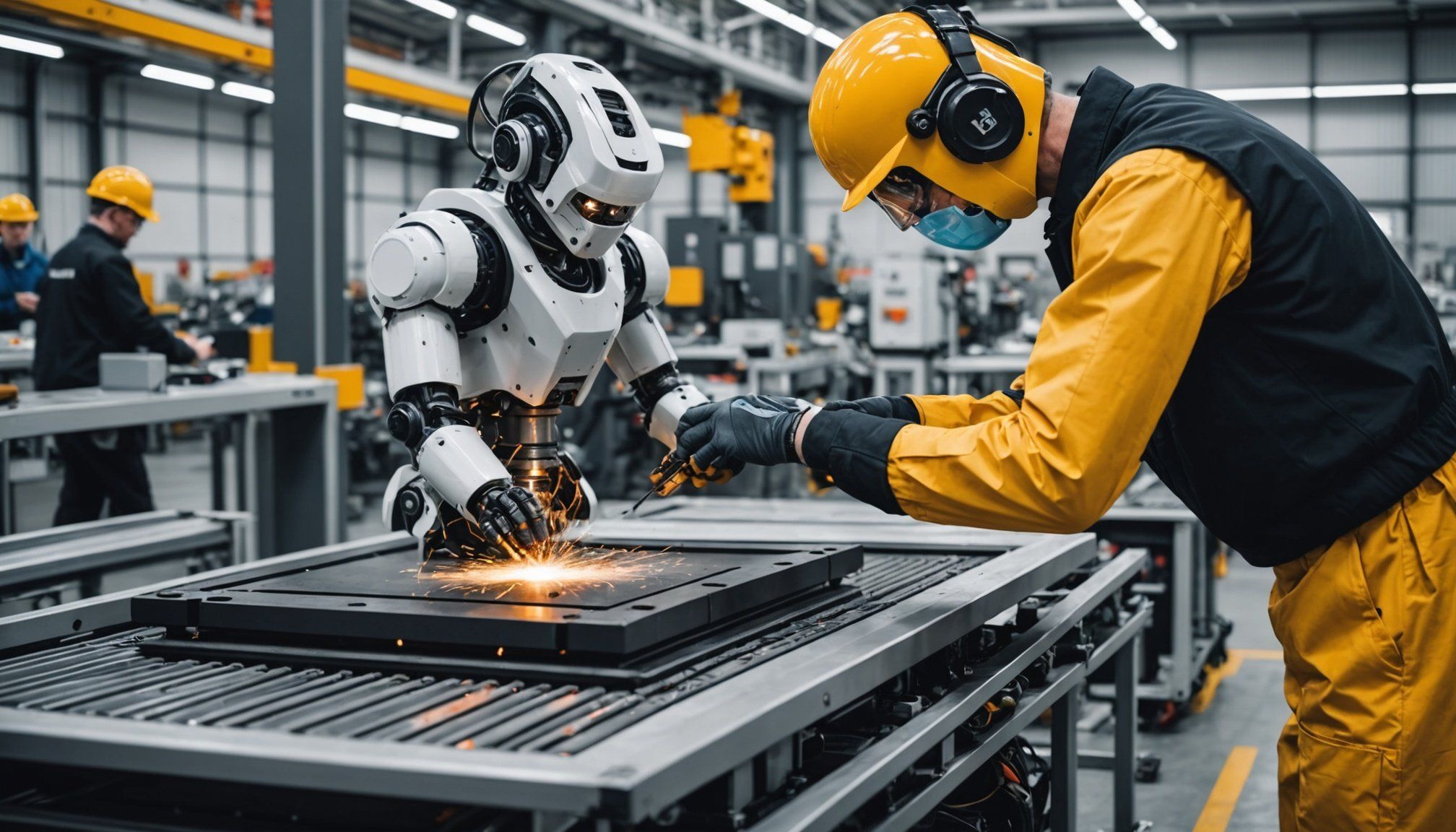Future Trends in AI and Manufacturing
Future of Manufacturing is evolving rapidly, shaped by advancements in AI Innovations. Manufacturing processes are becoming more automated, with AI technologies playing pivotal roles in predictive analytics, robotics, and quality control. Industry 4.0 is expected to bring even greater integration across industrial sectors.
One crucial development in the industry 4.0 era is the impact of AI technologies on manufacturing jobs and workforce. While AI is likely to automate repetitive tasks, it will also create new opportunities by requiring workers to develop new skills. This technological shift necessitates ongoing training programmes to prepare the workforce for emerging job roles.
Also read : Transforming UK FMCG Supply Chains Through Predictive Analytics: Achieving Maximum Efficiency
Predictions for AI advancements suggest significant improvements in production efficiency, including zero-defect manufacturing and enhanced supply chain management. The UK Industry stands at the forefront of embracing these changes, leveraging government initiatives and private sector investments to maintain a competitive edge.
Strategies for staying ahead underscore the importance of continuous learning and adoption of state-of-the-art technologies. Manufacturers should invest in research and development to foster innovation and adaptability. Engaging in collaborations with tech firms and academic institutions can also facilitate the seamless integration of AI into manufacturing operations, maintaining relevancy in a rapidly evolving landscape.
In the same genre : Essential Factors to Consider When Creating a Machine Learning Model for Predicting UK Stock Market Trends
Understanding AI in UK Manufacturing
The integration of AI technologies into the UK manufacturing sector is transforming operational efficiency. AI enables predictive maintenance, optimising machinery uptime, and ensuring production processes run smoothly. This enhancement significantly reduces downtime, a common challenge in traditional manufacturing settings. The UK Industry is actively incorporating AI to maintain competitiveness and drive innovation.
AI Integration in Manufacturing is not limited to automation of tasks but includes superior analytics capabilities. By analysing vast datasets, AI systems predict demand trends, allowing manufacturers to align production schedules accordingly. This agility ensures that businesses remain responsive to market dynamics, increasing overall efficiency.
Current trends showcase a growing appetite for AI across various manufacturing industries in the UK. From large automotive firms to small-scale operations, the desire for AI technologies stems from their proven impact on cost reduction and quality improvement. Companies are not only investing in AI tools but are also fostering a culture of innovation to stimulate long-term growth.
Acknowledging the pivotal role AI plays, the manufacturing sector is prioritising its adoption as a cornerstone strategy. By leveraging the capabilities of AI, UK manufacturers can expect substantial improvements in their operational processes, setting benchmarks for global counterparts.
Strategies for Seamless AI Adoption
Navigating the AI Adoption Strategies in manufacturing requires a well-structured approach. Successful implementation begins with a step-by-step framework. This framework should be tailored to the company’s unique needs, ensuring a holistic integration of AI Technologies into existing processes.
Firstly, identifying key stakeholders is crucial. Their roles vary from overseeing AI Integration in Manufacturing to managing change and evaluating performance. Stakeholders include executives, IT professionals, and end-users, each bringing valuable perspectives that shape the AI roadmap.
A clear AI adoption roadmap should outline timelines, objectives, and measurable outcomes. This planning involves assessing current technological capabilities and setting realistic goals for AI-driven improvements. It is essential to maintain flexibility, allowing for adjustments as needed to cater to unexpected challenges.
Collaboration with technology partners can expedite the implementation process, providing access to expertise and cutting-edge solutions. Training programmes for employees are equally important, facilitating a smooth transition and fostering a culture that embraces AI.
Strategically adopting AI will not only enhance efficiency but also ensure that the UK Industry remains competitive in a global landscape, setting standards for future success.
Challenges and Solutions in AI Adoption
Implementing AI technologies in manufacturing presents several challenges. Companies often face complex AI Implementation Challenges due to the integration of new systems into existing processes. These challenges can include data privacy concerns, the financial investment required, and a lack of in-house expertise.
A significant barrier is the difficulty in aligning AI systems with legacy technology. Manufacturers need to enhance their risk management strategies to address potential operational disruptions. Training programs are essential components, helping bridge the skill gap and prepare workers for new roles introduced by AI innovations.
Overcoming Barriers involves careful planning and execution. A focus on risk management can help mitigate these challenges, ensuring smooth transitions. Change management is crucial; fostering an environment that embraces new technology supports seamless integration. Open communication between stakeholders and continuous feedback loops can facilitate this process.
Another critical solution is developing a well-structured AI adoption roadmap. This plan should clearly outline objectives, timelines, and measurable outcomes, allowing companies to stay aligned with their goals. By addressing these challenges head-on, the UK manufacturing sector can fully realise the benefits of AI, enhancing both productivity and competitiveness.
Real-World Examples of AI Implementation
Exploring case studies of successful AI implementation helps understand practical applications and outcomes in UK manufacturing. By examining various companies, we gain insights into diverse strategies and technologies employed effectively.
Case Study: Company A’s AI Journey
Company A leveraged AI Technologies to enhance production line efficiency. By integrating predictive analytics, they successfully reduced downtime, increasing productivity by 15%. This achievement resulted from a comprehensive approach, including collaboration with tech partners and investing in robust training for staff.
Case Study: Company B’s Strategic Approach
Company B’s strategy centered on AI Integration in Manufacturing through advanced robotics. Automating repetitive tasks led to cost reductions and operational improvements. Emphasising stakeholder involvement and a clear AI adoption roadmap, Company B set benchmarks for industry excellence.
Case Study: Company C’s Lessons Learned
Company C faced challenges initially but overcame them by focusing on data-driven decision-making. Their integration of AI revolutionised supply chain management, aligning production with market demands. The success attributed to their adaptability and engagement with AI specialists, highlighting the significance of strategic implementation in the UK Industry.
These real-world examples reflect the significant potential and diverse applications of AI in transforming manufacturing processes across the industry.











